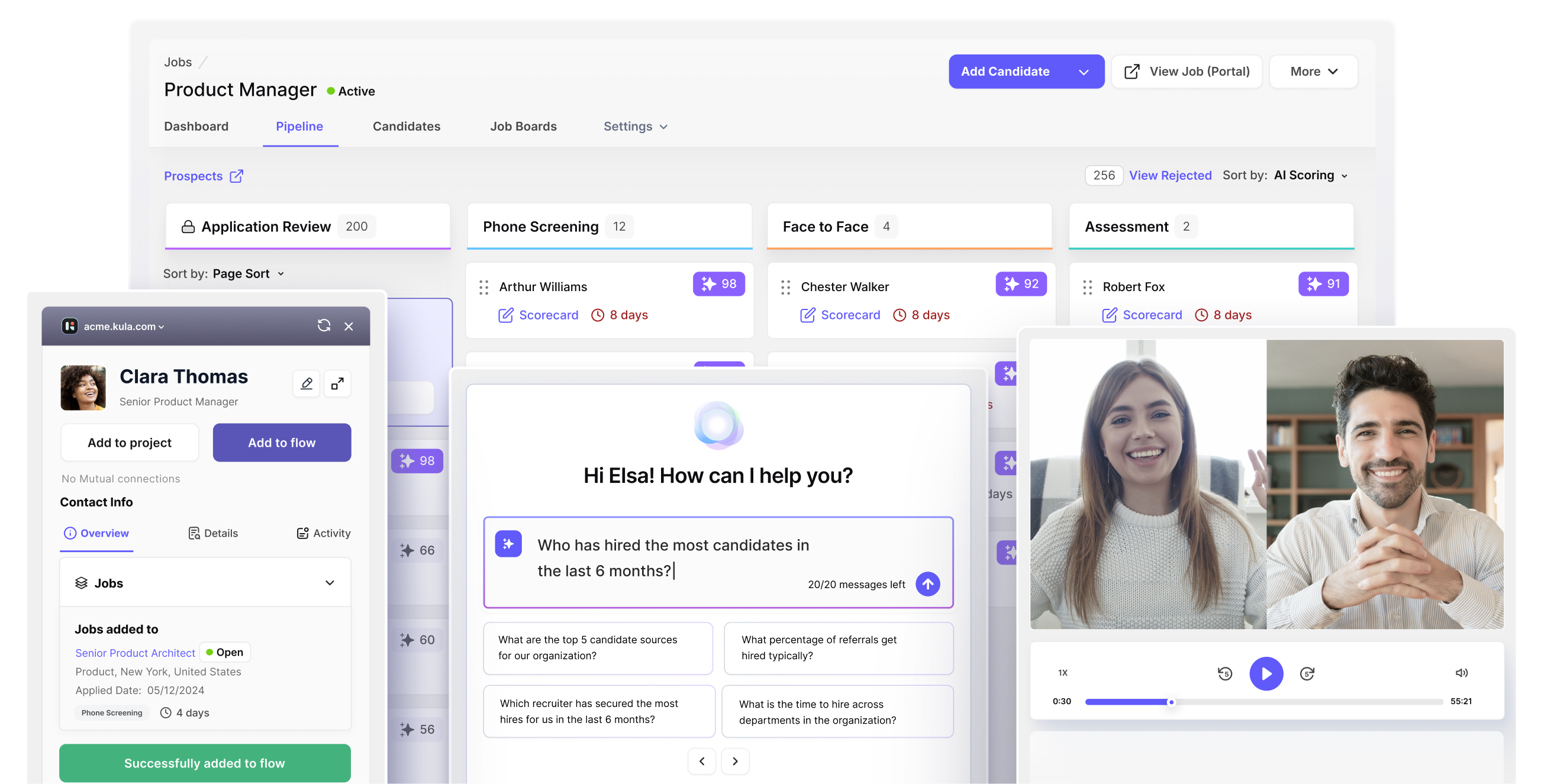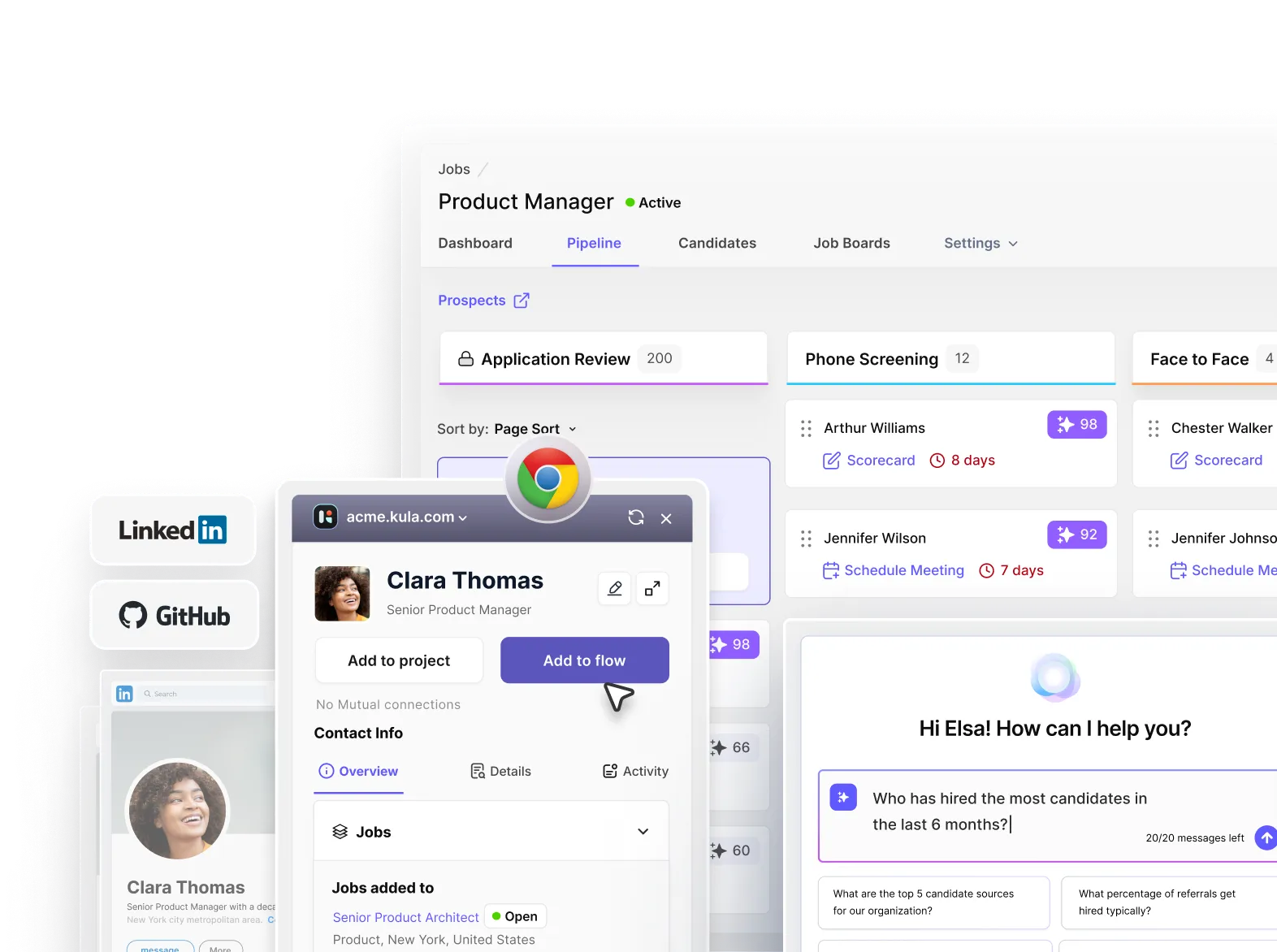Book a 30-minute demo and learn how Kula can help you hire faster and smarter with AI and automation
If you have been wondering if you should call it "recruiting," "recruitment," or "talent"?
You're not alone.

This little word choice might seem trivial, but it can say a lot about how you approach building your dream team.
So, grab your favorite caffeine fix, and let's dig into this linguistic debate.
A quick note before we begin
Before we jump in, let's be clear: there's no universally "right" or "wrong" way to describe what we do.
Different terms might work better in different contexts, cultures, or organizations.
Our goal here is to give you some food for thought as you shape your own approach.
We're basing this on general trends and observations, but your mileage may vary.
Alright, with that out of the way, let's get to the good stuff!
Breaking it down: Recruiting vs. Recruitment
Let's start with the classics: "recruiting" and "recruitment."
At first glance, they might seem interchangeable.
But in our industry, they often carry slightly different connotations.
Recruiting: The proactive approach
When people talk about "recruiting," they often picture a more dynamic, proactive process. It's like being a talent scout in the sports world - always on the lookout for the next superstar, even when you don't have an immediate opening.
Recruiting might involve:
- Building relationships with potential candidates over time
- Attending industry events to network and spot talent
- Engaging with passive candidates who aren't actively job hunting
- Creating and maintaining talent pools for future needs
It's the "I saw you give an amazing presentation at that conference, and I think you'd be a great fit for our team" approach.
Recruiting is often associated with a more aggressive, sales-like mindset in talent acquisition.
Recruitment: Structure and process
On the flip side, "recruitment" tends to evoke a more structured, procedural approach.
It's often seen as the formal process that kicks in when you have a specific position to fill.
Recruitment might include:
- Posting job advertisements
- Screening resumes and applications
- Conducting interviews and assessments
- Managing the offer and onboarding process
It's the "We have an open position, let's post it and see who applies" method. This doesn't mean it's less effective - many organizations have highly successful, well-oiled recruitment machines.
It's just a different flavor of talent acquisition.
Interestingly, when we polled our network, "recruiting" came out on top.
This preference aligns well with the fast-paced, proactive culture we often see in many businesses today, especially in competitive industries where talent is in high demand.
Also read: Top 12 recruiting strategies: A complete guide to effective recruiting
The rise of "Talent": A holistic approach
But wait, there's more to this story!
"Talent" is gaining traction in the HR world, with 23% of our poll respondents giving it a thumbs up.
But what does it mean when we talk about "talent acquisition" or "talent management"?
Using "talent" in your terminology suggests a more holistic, long-term approach to workforce management.
It's not just filling open positions - it's finding, developing, and retaining great people throughout their entire journey with your organization.
When a company talks about "talent," they're often signaling:
- A focus on long-term career development, not just immediate job placement
- An emphasis on employee engagement and retention
- A strategic approach to workforce planning and succession management
- A commitment to creating a strong organizational culture
It's like saying, "We're not just here to fill seats. We're building a powerhouse team for the long haul."
This approach aligns well with current trends in employee engagement and retention strategies.
The impact of language on employer branding
Now, here's where things get really interesting.
The terms you choose can actually shape how people perceive your company in the job market.
If you're all about "talent" in your job ads and career pages, you might attract candidates who are looking for long-term growth opportunities and a company that invests in its people.
You're signaling that you see employees as valuable assets to be developed, not just slots to be filled.
Sticking with "recruitment" might appeal to candidates who value structure, clear processes, and traditional career paths. It can suggest stability and a well-established approach to hiring.
Using "recruiting" could attract go-getters who appreciate a proactive, dynamic approach.
It might signal that you're always on the lookout for great people and that there could be opportunities even when you're not actively advertising positions.
The key here is alignment.
Make sure your choice of words matches your actual practices and organizational culture.
If you're talking about "talent development" but your onboarding process is outdated or you lack clear career progression paths, candidates might feel misled.
Proactive vs. reactive: What's your style?
Your choice of terminology can also hint at your overall approach to building your team.
A "recruiting" mindset often suggests a proactive approach.
You're not waiting for positions to open up - you're constantly building your network, nurturing relationships with potential candidates, and thinking ahead to future needs.
It's about creating a pipeline of talent so you're ready when opportunities arise.
A "recruitment" focus might imply a more reactive approach - you kick into gear when you have a specific position to fill.
This can work well for organizations with stable, predictable hiring needs or in industries where specialized skills are required for each role.
"Talent" can encompass both proactive and reactive elements. It's more about taking a strategic, big-picture view of your workforce.
Whether you're proactively building talent pipelines or focusing on developing your current team, "talent" suggests you're thinking beyond just filling immediate openings.
Balancing long-term strategy and immediate needs
Let's face it: Sometimes you just need to fill a position ASAP.
But even when you're in firefighting mode, keeping an eye on the long game can pay off big time.
That's where a "talent" mindset can really shine. It's not just about today's open req - it's about building a team that can tackle tomorrow's challenges.
This strategic approach could involve:
- Building relationships with promising candidates, even when you don't have an immediate opening
- Investing in training and development programs for your current team
- Creating clear career paths so your top performers can see a future with you
- Focusing on your employer brand to attract passive candidates
- Implementing succession planning to ensure continuity in key roles
- Using data and analytics to predict future talent needs
By thinking in terms of "talent," you're positioning your organization to be more resilient and adaptive in the face of changing business needs.
Choosing the right terminology for your organization
After all this discussion, you might be wondering which term is right for your organization. The truth is, there's no one-size-fits-all answer.
Your choice depends on various factors:
- Organizational culture: What's the vibe of your company? Are you a fast-paced startup that needs to be constantly on the hunt for new talent? Or are you a more established organization with a focus on developing from within?
- Industry norms: What's common in your field? Sometimes it pays to stand out, but in other cases, using familiar terminology can help candidates understand what you're about.
- Target audience: Think about the type of candidates you're trying to attract. What terminology would resonate most with them?
- Strategic focus: Are you primarily focused on filling immediate openings, or are you more concerned with long-term talent development and retention?
- Global considerations: If you're operating in multiple countries, be aware that terms may have different connotations in different regions.
- Company size and structure: A small company might prefer the agility implied by "recruiting," while a larger organization might lean towards the more structured approach of "recruitment" or the strategic implications of "talent."
- Growth stage: Are you in rapid expansion mode, or are you focused on optimizing your current workforce? This can influence whether you need a more aggressive "recruiting" stance or a developmental "talent" approach.
- Competitive landscape: In highly competitive industries, the proactive connotations of "recruiting" might give you an edge. In others, the stability implied by "recruitment" might be more attractive.
It's more than just semantics
At the end of the day, whether you're team "recruiting," "recruitment," or "talent," what really matters is how you treat people.
Are you creating an environment where great people want to work?
Are you helping your team grow and thrive?
Your choice of words can be a powerful signal of your intentions and approach.
But remember, actions speak louder than words.
Make sure your practices back up your terminology, and you'll be on your way to building an awesome team.
Here are some final thoughts to consider:
- Consistency is key: Whatever term you choose, use it consistently across your communications, from job ads to onboarding materials.
- Be authentic: Choose terminology that genuinely reflects your company's values and practices.
- Stay flexible: As your organization evolves, be open to revisiting your terminology. What works now might not be the best fit in a few years.
- Focus on the candidate experience: Regardless of what you call it, make sure your processes are clear, respectful, and candidate-friendly.
- Keep learning: Stay informed about trends in talent acquisition, but don't feel pressured to change just because a new term is popular. Do what works for your organization.
So, what's your take?
Are you all about that proactive "recruiting" life?
Digging the structure of "recruitment"?
Or are you on board the "talent"?
Whatever you choose, remember that the goal remains the same: building a team of great people who can drive your organization forward.
Keep focusing on that, and you'll be on the right track, no matter what you call it.






















